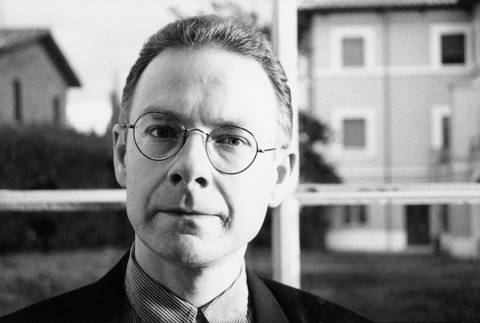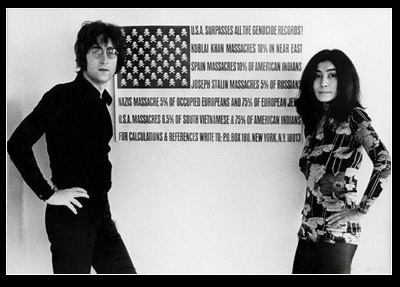Instant karma’s gonna get you,
Gonna knock you right on the head:
You better get yourself together,
Pretty soon you’re gonna be dead.
What in the world are you thinking of?
Laughing in the face of love!
What on earth are you trying to do?
It’s up to you – yeah you!
Instant karma’s gonna get you,
Gonna look you right in the face,
Better get yourself together, darling,
Join the human race.
How in the world are you going to see,
Laughing at fools like me?
Who on earth do you think you are?
A superstar?
Well alright, you are! ( John Lennon, Instant Karma )

Kate Bush: ... that resembled Bush as a young girl; several birds and a reproduction of a photograph featured on the cover of June 2000 edition of National Geographic, called 'Indus bird-mask'. As with the music, there were codes within the artwork so personal they will never be cracked. "She did discuss what she wanted to put across," says Wadsworth. "It was...pretty personal stuff, there were a few conversations about that." The title and cover were also carefully conceived, a combination of visual puns - at first the image looked like some desolate rock formation, but was actually a soundwave of birdsong - and layered wordplay. Aerial suggest flight and height, but it's also an antennae, a tool for sending and receiving. "And as I pointed out to her, it's also a washing powder that Mrs. Bartolozzi might want to use," says Wadsworth. "That might be the key." ~ Under the Ivy, Thomson, 2010, pp.297-298
“All and Everything” and nothing in between. The Tibetan Book of the living? Its a subject matter that was and is pretty ineffable; and its author and his identity, remains elusive. G.I. Gurdjieff inhabits a realm much as Churchill described his native Russia, ” a riddle, wrapped in a mystery, inside an enigma”. G.I. Gurdjieff ( 1872-1949) disguised himself with layers of acting, multiple personas, irony, sarcasm, ambiguity – with rumors of scandalous personal conduct intentionally encouraged, and with a misty, shadowy, mythologized, fairy-tale past.

Time Magazine once aptly described Gurdjieff as a "remarkable blend of P. T. Barnum, Rasputin, Freud, Groucho Marx, and everybody's grandfather."
John G. Bennett wrote a biography of Gurdjieff, and his ultimate assessment of the man was that he was “more than a Teacher and less than a Prophet. He was a man with a true mission and he devoted his entire life to it. He needed people who could understand his message and yet he was compelled to make the message obscure and hard to understand. Therefore, he had to look for those who could acquire the required perspicacity and also the singleness of purpose to carry his work forward. Today (1973), twenty-four years after his death, there are thirty or forty people in different parts of the world who are capable of transmitting the teaching, but there are very few who can look beyond the man to his message.”
The overarching theme of the book is the idea that in our normal state we human beings are asleep, unconscious, running on automatic. Our ideals, morals, ideologies, religion, art, and lofty philosophizing are all a sham, the product of instinctual groping in the dark, automatic mental associations, wishful thinking, bloated egotism, laziness, shallow romanticism. “It is possible to think for a thousand years,” said Gurdjieff. “It is possible to write whole libraries of books, to create theories by the million, and all this in sleep, without any possibility of awakening. On the contrary, these books and these theories, written and created in sleep, will merely send other people to sleep, and so on.”

"In order to more readily understand Gurdjieff's teaching one must understand Gurdjieff's view of the ordinary man, which was that the ordinary man, for the most part, was a machine among machines. Man reacts to what acts on him. However, something is wrong with this scenario: Man is just a machine among machines, but a machine which can be free, can be not a machine. From this Gurdjieff concluded that this would not be possible if there were not different levels of existence. On one level of existence man is just a machine existing among machines; but, on another level of existence, there exists the possibility of freedom. Gurdjieff, therefore, concluded that there are two worlds opened to man, both are here, not one far away."
The individual human organism is merely an animal, according to Gurdjieff, a self-deluded machine, following the course of least resistance, slipping unconscious day by day to its ultimately inevitable death. Occultist students would ask Gurdjieff about life after death, reincarnation, and so on, and he would reply that for most people, death is indeed the ultimate end, you go out like a light and that is it. Only for those who had persistently labored to develop a soul, a real, permanent, unchangeable “I,” was there any possibility that some essential quality of their being would survive the death of the physical body.

"During the Red recording sessions, Fripp encountered the psychological/cosmological teachings of the Graeco-Armenian magus George Gurdjieff (who also influenced the recording artist Kate Bush). Crimson's perpetual instability and his own doubts about his high aims had created a charged atmosphere, Fripp was reading a book by Gurdjieff's pupil John Bennett, which posed the question Is There 'Life' on Earth?. Fripp reacted to its multiple implications. It was a transformative experience that led a now ego-less Fripp to virtually erase himself from the industry. He took a ten-month sabbatical at Sherbourne House, an "esoteric school" founded by Bennett....."
“Despite presumably being a more advanced human being than the rest of us, he was a notoriously bad driver. For some reason he felt compelled to drive on the wrong side of the road, and at very high speed. One follower who went on one such white knuckler with Gurdjieff said he would drive until the car ran out of gas, then insisted a mechanic be fetched, refusing to believe the car had merely run out of fuel. In 1949 he died in a car wreck, predictably.”
After a major car accident in 1925, which found Gurdjieff in a coma for five days, he eventually regained consciousness and turned his full attention to writing. Every day, at his favorite café in Paris or on the grounds of the Prieuré, he dictated a manuscript in Russian and Armenian. For years this manuscript was only brought out to be read aloud by pupils under his watchful eye. A few carbon copies were circulated among favored pupils, and in the early 1930’s an attempt to raise money was made by selling the copies for fifty dollars each. In time, this mysterious book achieved almost the status of a religious relic, until, in the last months of his life, by one of those abrupt reversals for which he was famous, Gurdjieff gave instructions for the manuscript to be published. In 1950, the mystery was exposed in print.

Kate Bush:"Kate was apparently first exposed to the teachings of Gurdjieff through her two older brothers, and while she herself is not deeply involved in the Work (indeed she has often, in interviews and in her lyrics, admitted to her own 'laziness' and resistance to such things), she has sparked an interest in many of her fans which has led them to further explore the Gurdjieff material. Some examples of these references in her music include "Them Heavy People," a song about the initial "inconvenience" and frequent discomfort of spiritual transformation, from her first album, "The Kick Inside". In it she sings, "They opened doorways that I thought were stuck for good/ They read me Gurdjieff and Jesu/ They build up my body/ Break me emotion-ally, it's nearly killing me/ But what a lovely feeling!" The song "Strange Phenomena" talks about clairvoyance, prescience, and synchronicity: "'G' arrives, funny, had a feeling he was on his way." And a third song on the album, "Kite," begins with the line, "Beelzebub is aching in my belly-o." In "Fullhouse," from the "Lionheart" album, the refrain is "remember yourself." (Kate also had this phrase stamped into the vinyl on British pressings of "The Kick Inside.")
It turned out to be, of all things, a space odyssey.
“It was in the year 223 after the creation of the world, by objective time-calculation, or, as it would be said here on the “Earth,” in the year 1921 after the birth of Christ.
Through the Universe flew the ship Karnak of the “transspace” communication.
It was flying from the spaces “Assooparatsata,” that is, from the spaces of the “Milky Way,” from the planet Karatas to the solar system “Pandetznokh,” the sun of which is also called the “Pole Star.”
On the said “transspace” ship was Beelzebub with his kinsmen and near attendants.”

---That's interesting--either "Fullhouse" was written before TKI was mastered or Kate was mindful of the phrase (and perhaps both, but almost certainly the latter.) Mike Weaver's brilliant "Undercurrents" essay in Break-Through #11 is the most authoritative writing I've read on Gurdjieffian influence in Kate's early lyrics.---
So begins “All and Everything” , one of the most grandiose and allegedly infuriating philosophical works ever composed. A colossal book of over 1,200 pages, it was written “to destroy mercilessly the beliefs and views of the reader, by centuries rooted in him, about everything existing in the world”.
Gurdjieff advised his readers to read each of his ” written expositions” three times before trying to fathom the gist of them. It was good advice. He despised what he called the “bon ton” style and wrote with an oriental elaboration that gives his arguments the intellectual equivalent of the design on a Persian carpet. Gurdjieff himself, at the sessions where the pupils read the book aloud, would give synopses of the meaning of each passage and roar with laughter at the jokes he had inserted. In fact, the joke is on the reader who tries to make deadly serious sense out of every last word.

"... As an aside, this fact of life demonstrates the sheer good sense and realism of the teaching of Purgatory – a teaching shared by Gurdjieff and mainstream Christians. This is yet another reason why, the more I study Gurdjieff, I see the main influence on him as being Greek Christianity, which holds the concept of Purgatory while rejecting that Latinate word. This is not such a detour from Lennon as may seem, for in “Karma!”, the law of cause and effect works as a sort of Purgatory. First, in the verses, there comes the judgment, and then in the chorus, the exaltation. This, it seems to me, is how the song hangs together. The verses are chiefly, but not entirely, given over to warning and admonition,..."
“All and Everything” is a brilliantly contrived maze, part deliberate deception, part comic extravaganza, part profound mystical philosophy. Gurdjieff,s own judgement of it was simple and blunt: “Epics will be written by men who have understood something in ‘Beezlebub.'”
Instant karma’s gonna get you,
Gonna knock you right off your feet
Better recognize your brothers,
Everyone you meet.
Why in the world are we here?
Surely not to live in pain and fear.
Why on earth are you there,
When you’re everywhere?
Come and get your share.
The dictation of his books, the debilitating effects of the car crash, the exhausting work with pupils- all these took their toll. The situation was not helped by his uncompromising and, some thought, brutal treatment of individuals and groups who taught in his name. Reproached for one especially lacerating verbal attack on a disciple, he was asked why he bothered with such people in the first place if he was later to repudiate them so violently. Gurdjieff is said to have replied: ” I needed rats for my experiment”.
The depression came and he was forced to sell his crumbling property; The Institute for the Harmonious Development of Man, one of the most ambitious experiments in raising humanity by their psychic bootstraps ever attempted, was closed forever. Nonetheless, from his Paris apartment people still sought him out for the same reason as always: in the hope of acquiring a soul.

"And so Lennon had this tremendous insight, that by taking action now we can remedy the crimes and errors of the past and build a better future. Taken as a whole, the song is a century of thought and wisdom in three minutes and about 23 seconds. It takes us from judgment and condign punishment to justification and exaltation. But there is one more matter to mention before leaving: karma. Is karma in fact the notion of cause and effect, that one is one’s past and cannot escape it? What karma initially was, I don’t know, but Gurdjieff had an interesting view of it, retained (so far as I know) only in Ferapontoff’s Constantinople ..."
One thing did not change- the enigmas that trailed him like shadows. People who came to see him during this period saw either a corpulent, slightly seedy Russian Armenian with a stained waistcoat, who smiled a little too much and a little too broadly and affected an arrogantly cryptic manner, and about whom stories circulated of his insatiable sexual appetites; or else they felt themselves to be in the presence of a man who scrupulously measured their spiritual weight and was unsparing yet respectful of their individuality. All agreed on one thing, however; Gurdjieff was a master trickster who could assume any character at will. Even his towering rages seemed to be a deliberate act, from which he himself stood a little apart, watching to see what effect they would have on their audience.

John Azize:“I call the ‘sublime’ that precious, subtle feeling of myself as if on the cusp of touching the mystery of eternity. It is the life of what Gurdjieff called the “higher emotional centre”, and its music is, as it were, music delivered through the flesh, but heard by the ears of the soul. … For example, when I listen, with quiet attention, to Elton John’s “Someone Saved My Life Tonight” or “Funeral for a Friend”, I feel that there is something majestic swelling in and above the music, which calls me on and upwards.” And I’m not alone in that.
Well, we all shine on,
Like the moon and the stars and the sun.
Yeah, we all shine on,
On and on and on, on and on.
Well, we all shine on,
Like the moon and the stars and the sun. ( John Lennon, Instant Karma )
After yet another car accident in 1949, he miraculously recovered, but then faded and his disciples learned that G.I. Gurdjieff was dead. He was, for good or ill, one of those rare beings-a Master.What a master says is less important than what he is. He treaches by being. What there was to be learned from Gurdjieff could probably be learned best by contact with the man, by rubbing against his presence until the friction produced a spark that would ignite something in the other person.
Gurdjieff, was, in other words, an alchemist of the soul, creating heat by which the coarse spiritual body could be transmuted into gold; but like the alchemists of old, he needed a little bit of gold in the other person to begin the Great Work. In fact, a generation before C.G. Jung published “Psychology and Alchemy” , Gurdjieff had pointed out the spiritual significance of the medieval alchemist’s quest for the arcanium, and the metaphor of transmutation through fire, heat, or cooking often appears in his teaching.
Today, sixty years after his death, the reverberations of his words and thoughts still disturb. “Do you want to die like dogs?” he would shout at his pupils when he thought they were lazy and backsliding. To such a question only one response is possible. That is why Gurdjieff group and their offshoots still meet an enroll new disciples; why the sacred dances he introduced to the West are still performed in esoteric circles; why his own writings are still in circulation as well as books about him.
The Western world, meanwhile, is still in a fine mess. And there are still people today who believe that Gurdjieff was offering mankind a practical way to clean it up.





 COMMENTS
COMMENTS